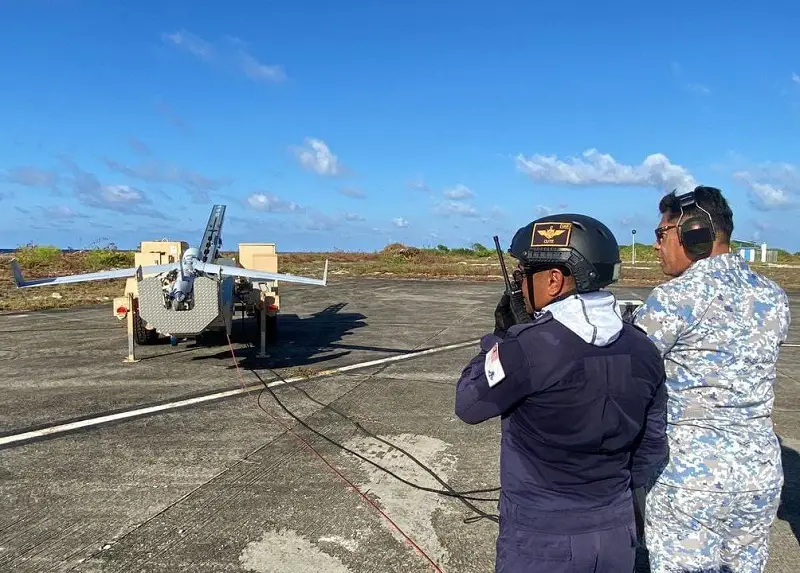In a significant development, the Exercise Angkasa Samudera have showcased the operational prowess of the Royal Malaysian Navy’s (RMN, Tentera Laut Diraja Malaysia) Skn 601 in the utilization of ScanEagle unmanned aerial vehicle (UAv). This advanced UAS system has been successfully deployed at the Royal Malaysian Navy LIMA Station on Layang-Layang Atoll within the Spratly Islands. In a recent update on social media, the RMN revealed images of the Chief of Navy, Admiral Tan Sri Abdul Rahman Ayob, during his visit to the RMN LIMA Station. The visit aimed to oversee the operations of Skn 601 as it plays a pivotal role in the ongoing Eksesais Angkasa Samudera, a schedule set for the year 2023.
The Royal Malaysian Navy’s tweet also shed light on the functions of Skn 601, which operates the “ScanEagle” UAV primarily for Intelligence, Surveillance, and Reconnaissance (ISR) purposes. The United States contributed these UAV systems to Malaysia under the Maritime Security Initiative (MSI) program, aimed at bolstering maritime monitoring capabilities and the defense of allied nations. The introduction of the “ScanEagle” UAV system, along with its supporting equipment, is poised to elevate RMN’s Intelligence, Surveillance, and Reconnaissance (ISR) capabilities within the Layang-Layang Atoll and the broader Spratly Islands region, known for its geopolitical sensitivity.
As is well-known, the Spratly Islands, rich in oil and gas resources, remain a contentious zone, with regional players like China, Vietnam, and the Philippines asserting ownership over the entire area or parts thereof. China, for instance, has established military installations on various coral reefs in the Spratly Islands, deploying military aircraft, radar and communication facilities, and naval vessels. RMN’s decision to station the ScanEagle UAV system at LIMA Station on Layang-Layang Atoll undoubtedly enhances its capacity to monitor the territorial waters within the Spratly Islands. It is understood that the RMN possesses 12 units of the “ScanEagle” UAV system developed by Boeing-Insitu.
The Boeing Insitu ScanEagle is a small, long-endurance, low-altitude unmanned aerial vehicle (UAV) built by Insitu, a subsidiary of Boeing, and is used for reconnaissance. The ScanEagle was designed by Insitu based on the Insitu SeaScan, a commercial UAV that was intended for fish-spotting. Weighing around 22kg and capable of reaching a maximum speed of 150 km/h, the ScanEagle can operate for up to 12 hours, with an optimal operational altitude ranging from 762 meters to 1,524 meters. According to a statement from the US Department of Defense in May 2019, Boeing Insitu was awarded a contract worth US$48 million (RM216 million) to supply 48 units of the ScanEagle UAV system to Malaysia, Indonesia, the Philippines, and Vietnam.















